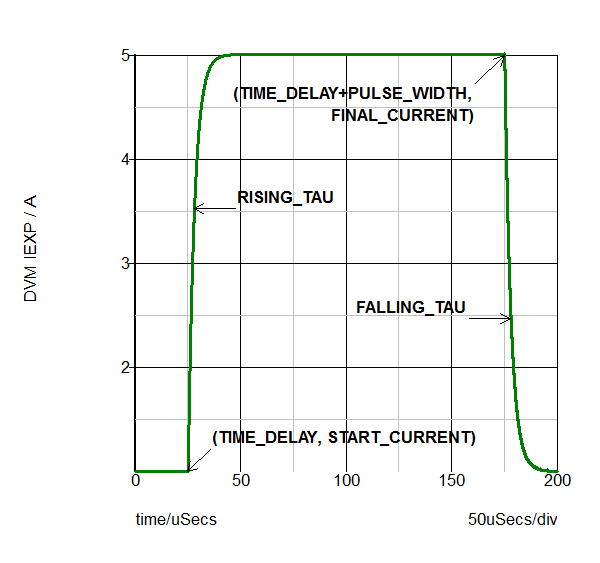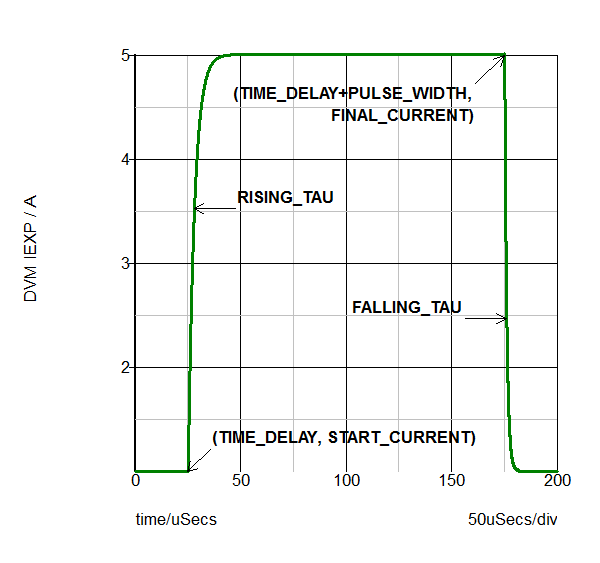DVM - Design Verification Module
|
The Pulse Load - Single Current Pulse w/ Exponential Decay subcircuit models a single exponential decaying pulse current load. This load is not used in any test objectives, but you can set a load to use this subcircuit with an Exp() call in the Load column of your testplan.
Other similar loads include:
In this Topic Hide
The following table explains the relevant parameters for the Single Current Pulse w/ Exponential Decay Load.
Note: This load is different than the other loads in that the RISE_TIME and FALL_TIME parameters are interpreted as time constants, as opposed to literal rise and fall times. These two parameters are highlighted in red text in the table below.
Parameter Name |
Default |
Data Type |
Range |
Units |
Parameter Description |
FALL_TIME |
50u |
Real |
min: 0 |
s |
The time constant of the rising edge of the pulse in seconds |
FINAL_CURRENT |
750m |
Real |
min: 0 |
A |
The pulse current for the load. This can be a numeric value or a symbolic value, such as a percentage of full load. |
IDLE_IN_POP |
0 |
Real |
0 or 1 | If set to 0, the load current during the POP analysis is set to the START_CURRENT; otherwise the load will be active during the POP analysis. | |
LOAD_NAME |
LOAD |
String |
n/a |
n/a |
Name of the DVM load. This name cannot contain spaces. |
PULSE_WIDTH |
200u |
Real |
min: 0 |
s | The pulse width in seconds.
Note: DVM considers the pulse width to be the duration of the pulse at the PULSE_CURRENT. |
RISE_TIME |
100u |
Real |
min: 0 |
s |
The time constant of the rising edge of the pulse in seconds |
START_CURRENT |
0 |
Real |
min: 0 |
A |
The starting current for the load. This can be a numeric value or a symbolic value, such as a percentage of full load. |
TIME_DELAY |
10u |
Real |
min: 0 |
s |
The time delay before the pulse initiates |
To set any managed DVM load to a Single Current Pulse w/ Exponential Decay subcircuit, place an Exp() testplan entry in the Load column.
The Exp() testplan entry has the following syntax with the arguments explained in the table below.
Exp(REF, START_CURRENT, FINAL_CURRENT, TIME_DELAY,
RISING_TAU, PULSE_WIDTH, FALLING_TAU)
Exp(REF, START_CURRENT, FINAL_CURRENT, TIME_DELAY,
RISING_TAU, PULSE_WIDTH, FALLING_TAU, OPTIONAL_PARAMETER_STRING)
where:
| Argument | Range | Description |
REF |
n/a |
The actual reference designator of the DVM load or the more generic syntax of OUTPUT:n where n is an integer indicating a position in the list of managed DVM loads. |
START_CURRENT |
min: 0 |
The starting current for the load. This can be a numeric value or a symbolic value, such as a percentage of full load. |
FINAL_CURRENT |
min: 0 |
The pulse current for the load. This can be a numeric value or a symbolic value, such as a percentage of full load. |
TIME_DELAY |
min: 0 |
The delay before the rising edge of the Exponential Pulse. The model TIME_DELAY parameter is set to this time value. |
RISING_TAU |
min: 0 |
The time constant for the rising edge of the Exponential Pulse. The model RISE_TIME parameter is set to this time value. |
PULSE_WIDTH |
min: 0 |
The pulse width of the Exponential Pulse, including the exponential rising edge |
FALLING_TAU |
min: 0 |
The time constant for the falling edge of the Exponential Pulse. The model FALL_TIME parameter is set to this time value. |
| OPTIONAL_PARAMETER_STRING | n/a |
Parameter string with any of the other parameters from the parameter table above* |
* If more than one parameter is specified, join the parameter key-value pairs with a space, as shown in the example below. The order of the parameter names does not matter.
The following example sets the first DVM managed load to a Single Current Pulse w/ Exponential Decay load with a starting current of 1A and a pulse current of 5A. This example shows a pulse with symmetric rising and falling edge time constants.
| *?@ Load | ||||
|---|---|---|---|---|
| Exp(OUTPUT:1, 1, 5, 25u, 3u, 150u, 3u) | ||||
The results of this testplan entry are shown below:

The following example sets the first DVM managed load to a Single Current Pulse w/ Exponential Decay load with a starting current of 1A and a pulse current of 5A. This example shows a pulse with asymmetric rising and falling edge time constants. The rising edge time constant is 3us, and the falling edge time constant is 1us.
| *?@ Load | ||||
|---|---|---|---|---|
| Exp(OUTPUT:1, 1, 5, 25u, 3u, 150u, 1u) | ||||
The results of this testplan entry are shown below:

© 2015 simplistechnologies.com | All Rights Reserved